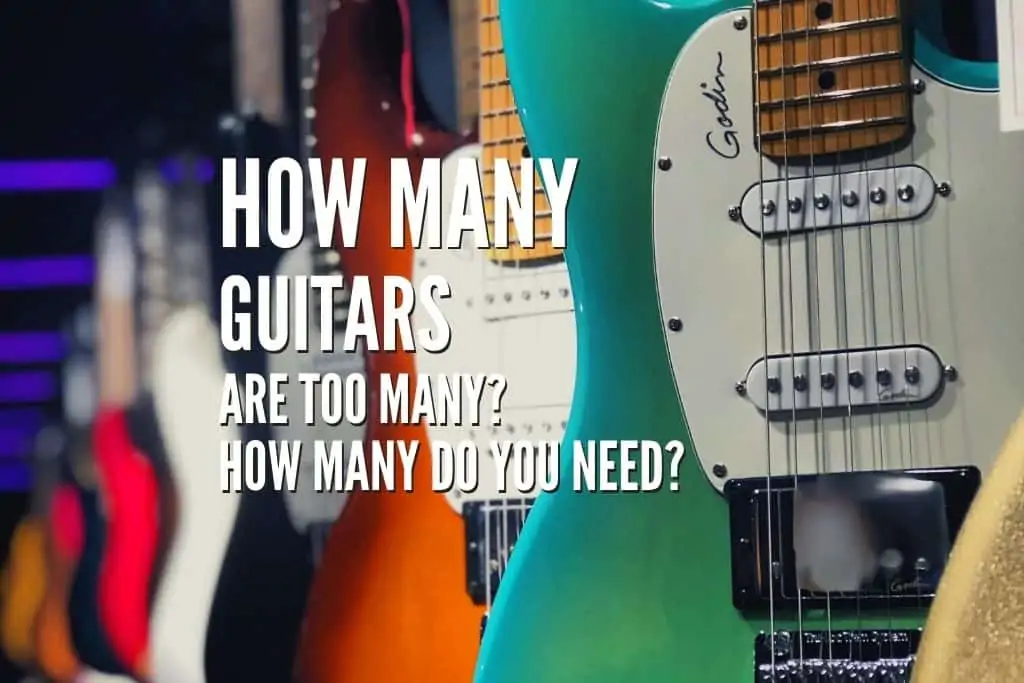Guitars come in different designs, sizes, shapes, and also intended uses. That’s why some people describe playing different guitars as a whole new experience.
But, How many guitars is too many? How many do you actually need? Generally, one electric guitar, one acoustic guitar, and one classical guitar are enough to satisfy your needs and cover all styles of music. If you have varied interests, you may want to add new guitars to experiment with different types of pickups configurations, body shapes, and different necks.
Music, as a way of escaping from the world, is a field where our consumption is the least essential, and it’s based on desires, not needs. We confuse the word “need”; we spend a lot of time talking about what we need while we’re actually talking about what we want. Owning more guitars than you actually need is not just a waste of global resources but also the time spent working and paying off guitars you never use.
Is There Such Thing As Too Many Guitars?
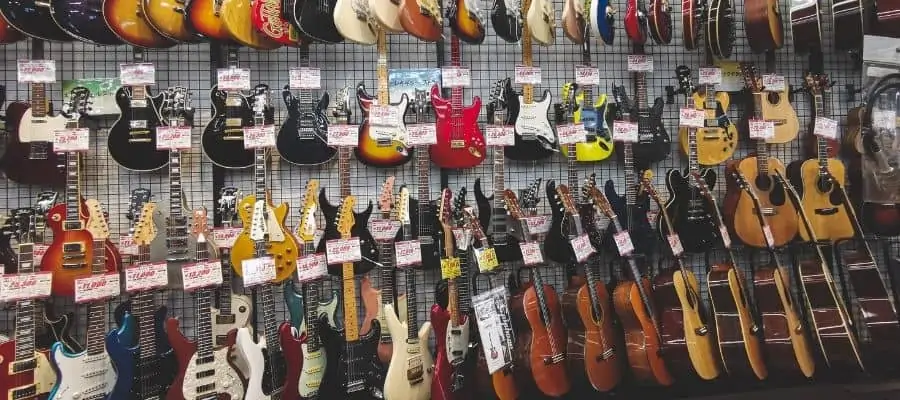
When you consider love for guitars, no, there is not such a thing as too many guitars. But practically, yes, there is!
If you don’t have the room to safely store any more of them, if you don’t have enough time and money to care about any more of them, and if you don’t have time to play any more of them, you have just enough. Anything but that is too many.
So, the thought is to find a balance between our wants and needs that affords us the ability to have available time to enjoy the instruments and to have as much versatility as possible within our budget.
Why Do Guitarists Need More Than One Guitar?
Some guitarists indeed gather up their guitar collection not just because of the desire. They find it necessary for many reasons. Even Jimmy Page, the iconic guitarist, used to bring eight guitars in the seventies for each Led Zeppelin stadium gig.
Different Guitar Sounds

There are so many different models of guitars, and they all sound and feel different. This is because of the difference in body type, pickups, or wood.
The main body woods are alder, ash, or mahogany. They all have different sounds, from bright to dark. Also, what’s important is the body type, where you can get a solid one, hollow or semi-hollow body. The solid-body electric guitar has the best sustain, while hollow bodies sound warmer.
Some guitars have pickups with a bright sound, such as single coil ones, whereas others have humbucker pickups with a darker and thicker sound.
Some songs will just sound better on an acoustic guitar than on a Les Paul, for example. That’s why some guitarists add a few different instruments to their musical collection.
Different Guitar Tunings
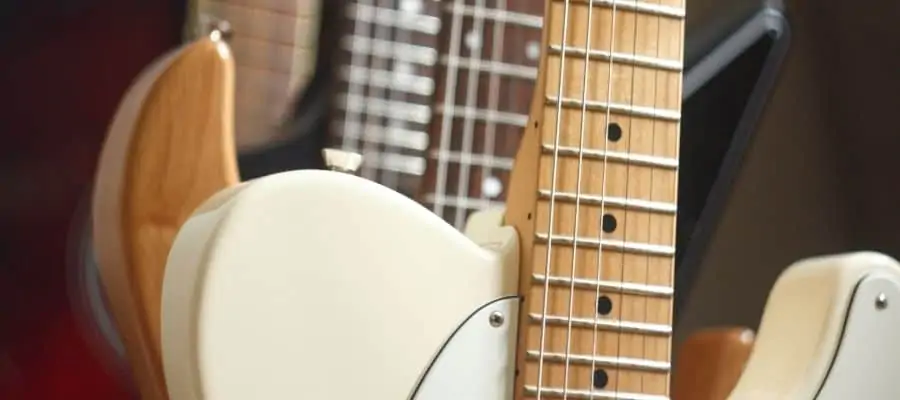
This is one of the main reasons why guitarists change guitars between songs because not all songs use the standard tuning of a guitar ( E-A-D-G-B-e). Some of the alternatives include drop D, drop C, open G, etc. To be sure you’re in the right tuning, you can use a tuner pedal or a headstock tuner, or the ears if they’re perfect.
Changing guitar tuning can steal guitarists’ time, so having more than one guitar certainly helps and saves them time; either you’re playing on your own at home, or you’re a mega-star playing on a huge stage.
A Spare Guitar
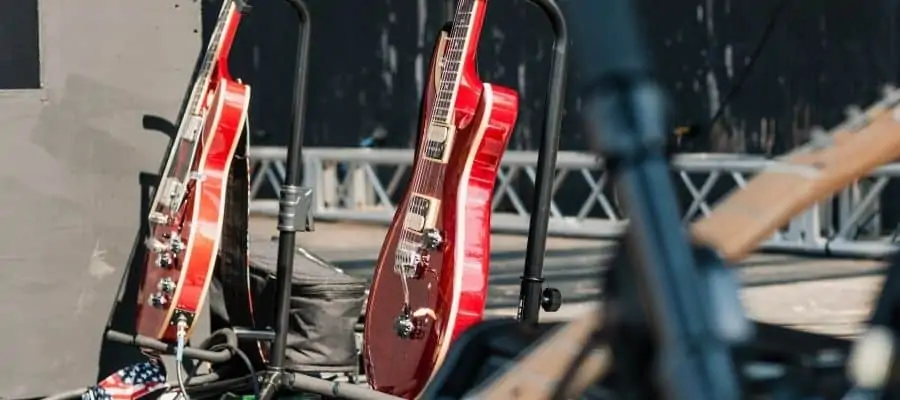
If you don’t have a spare guitar at hand, it can spoil the momentum of your gig or self-performance in the room. Some of the issues include electrical issues, the guitar being out of tune, string breakage, or guitar straps coming loose. You will be able to put on your backup guitar and continue playing without having to re-tune, without changing strings, and so on. It will save your time for sure. It’s better to be safe than sorry!
New Experiences
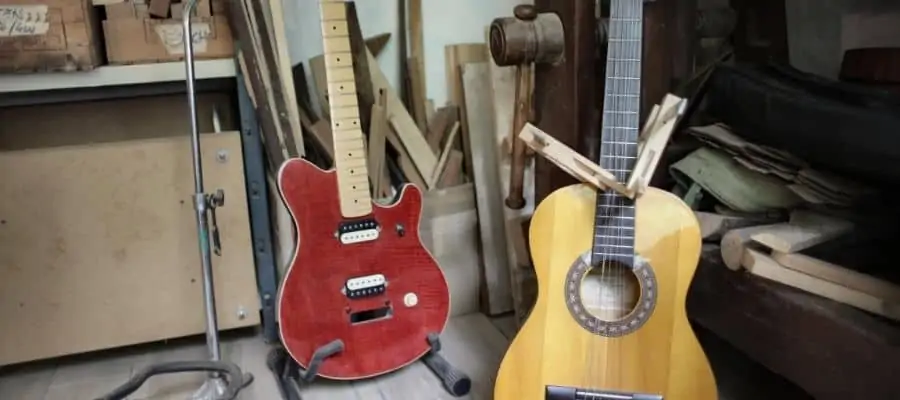
Different guitars have different sounds. A new guitar is going to inspire you to play it and pull you in new directions as a player. It can help you grow up by getting new ideas to the table.
What Is Guitar Acquisition Syndrome (GAS)?
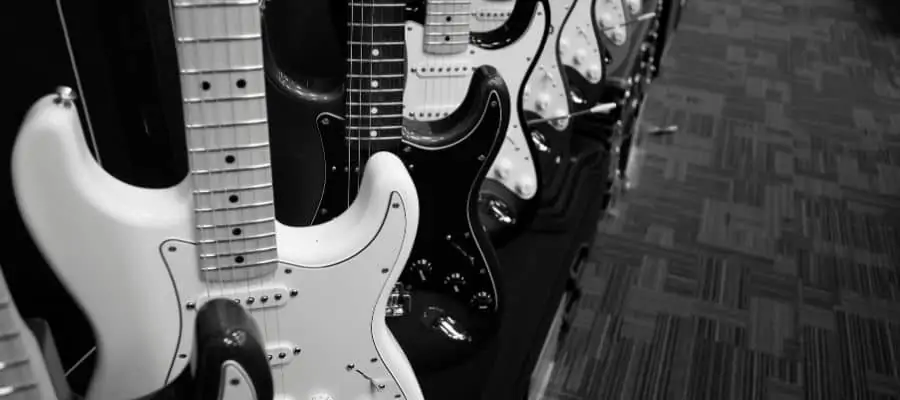
Gear Acquisition Syndrome also referred to as GAS or Guitar Acquisition Syndrome, is a condition where a musician can’t seem to purchase, trade for, or acquire enough instruments and accessories. They always find a reason to need something new. It’s easy to diagnose the GAS, and you don’t need a blood sample; just take a look at your search history.
The Problem With Guitar Acquisition Syndrome
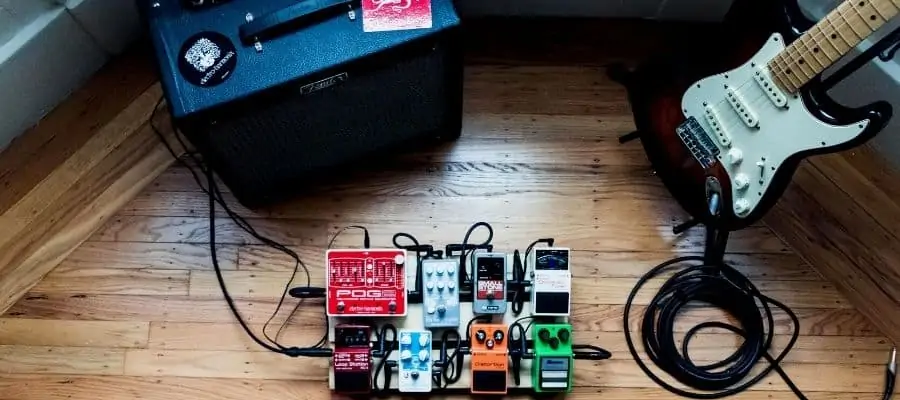
So many incredible amps and effects are out there! Collecting as much equipment as possible seems normal for most of the players. But, GAS can get out of control. It can start to impact other aspects of your life, such as finances, job, and relationships, and when the gear becomes more important than skills and practice, there’s the real problem!
Stages Of Guitar Acquisition Syndrome
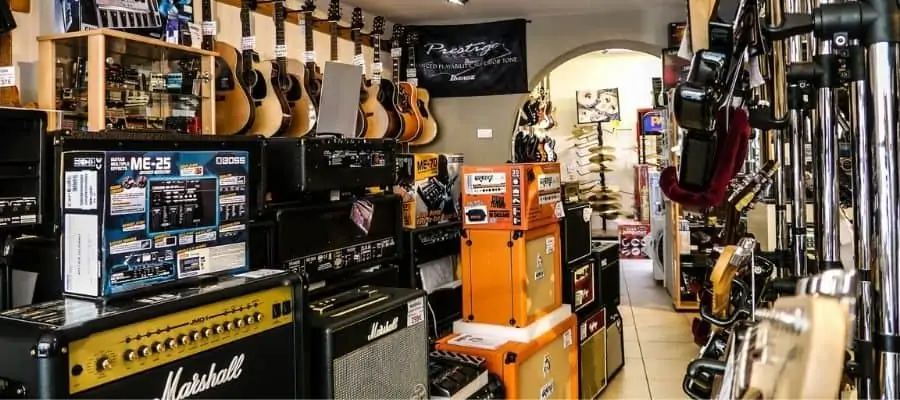
There are seven stages of Guitar Acquisition Syndrome; dissatisfaction, desire, research, purchase, guilt, acceptance, and relapse. The first stage is dissatisfaction, where a musician actually starts to hate the instruments and the whole equipment and thinks that others have something better and they’re laughing behind the back. The second stage is a desire; the guitarist sees the guitar and thinks only that guitar can bring happiness and even repair some other aspects of your life; for example, your family will appreciate you more.
After that comes the research. A guitarist starts to read product reviews, both good and bad ones. This stage is a GAS crunch time; for those who have a low-level infestation, bad comments are enough to delay the idea of buying the product, at least for a few weeks. But, for those who are in a deep GAS, there is no amount of bad words that can smash the shopping idea!
The fourth stage of GAS is a purchase, where the guitarist finally gets “the guitar of the life,” but soon, there comes a pang of guilt. That lifts in an hour, in a day, or a few weeks, so the guitarist is in an acceptance stage.
The last one is a relapse. Without this stage, there would be no problems.
How Many Guitars Should A Guitarist Have?
How many guitars a guitarist should have depends on a guitarist’s stage in playing and the needs, so this question is highly subjective.
The Beginner
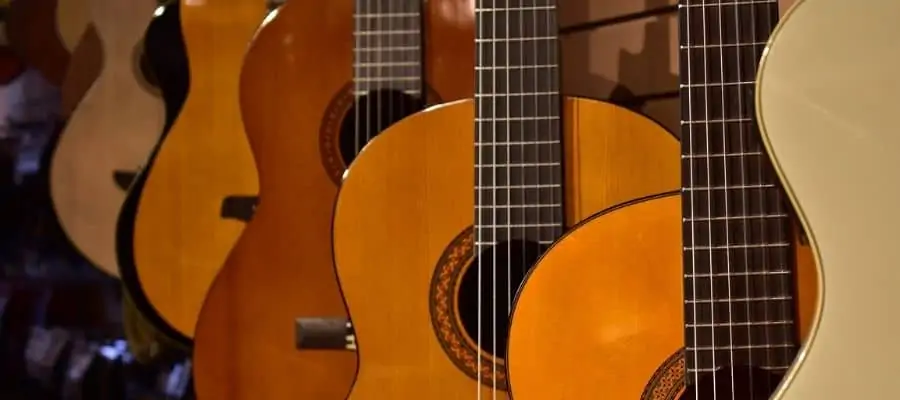
One guitar is enough for the beginner. It is not recommended to have a distraction at this stage in guitar playing. Little steps to success!
The Home Recording Guitarists
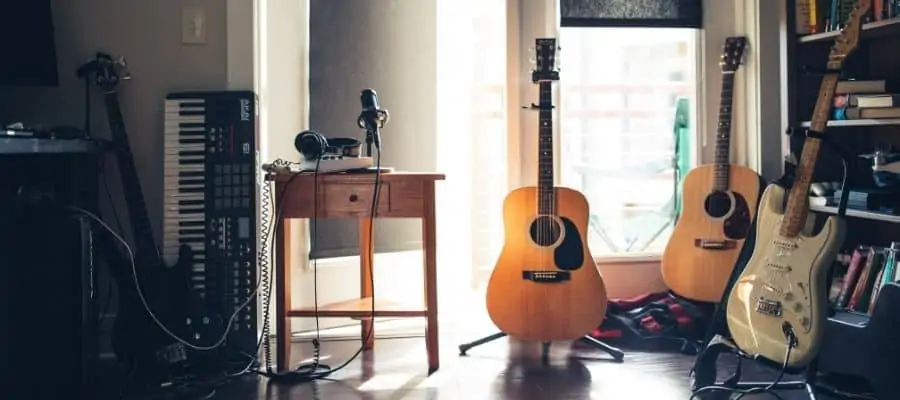
It depends on the genres of music the guitarists play and the sound they’re trying to achieve. If you cover all of the bases, you might own at least one small and one large body acoustic guitar, a bass, one single-coil, and one electric guitar with the humbuckers. Also, maybe a twelve-string one.
The Professional Guitarists
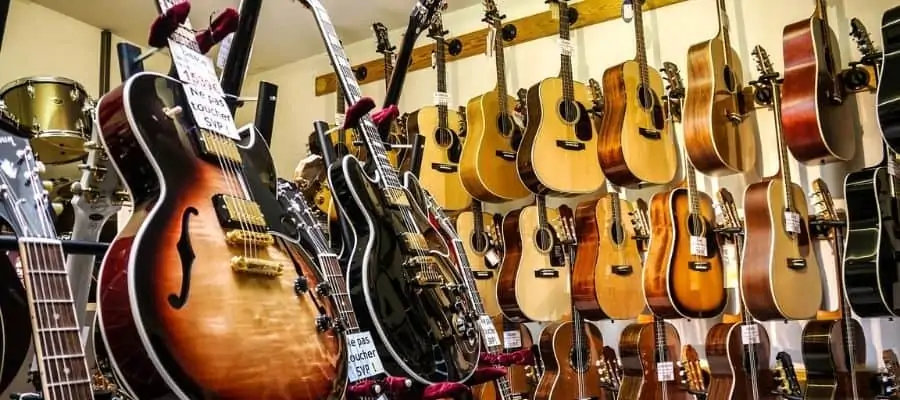
As many as they want, if they can justify it. It also depends on the genres of music. Also, it is good to have spare guitars to save time because the audience won’t enjoy watching them while they’re putting a new string on the guitar!
Do You Need Different Guitars For Different Songs?

Guitars come in plenty of colors, shapes, sizes, and configurations. Different guitars feel and sound differently, while different songs have different sounds and tunings.
It is easier to have different guitars for different tunings because guitarists save their time by just replacing guitars. So, you don’t need different guitars for different tunings because you can adjust the guitar you’re holding with a headstock tuner or a tuner pedal. Everything else is just the easier way.
But, what about different sounds? Some songs will just sound better on an electric guitar than on an acoustic guitar. You can adjust your guitar to have a similar sound as the other type, but the original is original. So, music experts advise one acoustic, one electric, and one classical guitar in every guitarists’ collection.
Should You Have A Guitar to Experiment Modifications With?

If you like experimenting and trying to get new sounds out of your guitar, having one to experiment modifications with is a really good idea. By experimenting on that guitar, you are on a good way to develop your own unique sound. You can find out what pickups might make your guitar better, or which type of nut would be better, and so on.
Owning just one guitar doesn’t allow experimenting because that leaves you with no playing options while your guitar is out for the count.
A goal is to make your primary guitar better with no fear of damage as you find out what custom options worked on the experimental one.
Should You Have A Guitar For Travel?

You probably want or even need to bring a guitar in case you’re going on a vacation or playing aboard. Guitars during travel can also be stolen, lost, or damaged. You might leave the guitar in the trunk, and it can disappear!
Also, your favorite instrument can be exposed to cold and heat, and that can damage your guitar; the temperature can lose guitar strings, loose glue that keeps wooden parts together, and so on. Also, you have to find a bubble wrap to be sure your guitar won’t get any damage while transporting.
An easier way with fewer worries is buying travel-size guitars that may fit in the suitcase without the need for a collapsible joint. This may be suitable for a person who travels a lot for their job or vacation. You can take it as hand baggage. This is not acceptable for the musical industry. The pros really have the burden on their backs!
Can Guitarists Be Happy Owning Just One Guitar?

As we said before, the number of guitars is a subjective thing. It is based on the player’s needs. Every guitar has a personality that is different from other guitars. But owning just one guitar can make a player happy! (unless the player is under GAS, of course) Of course, an acoustic guitar can never sound the same as an electric one, but after some guitar adjustments, it can be similar.
You need one guitar to get most of what you’re out there trying to find. Eric Clapton, Jimi Hendrix, David Grissom… They all did or still do the magic on just one style of the guitar.
First of all, you get to know the instrument; you get to know it back and forward, you make a special relationship with your guitar, so your improvement will be faster, and soon, you will be on a higher level. So, if the improvement in playing is the definition of a guitarist’s happiness, then what is?
Do Guitars Go Bad If Not Played?
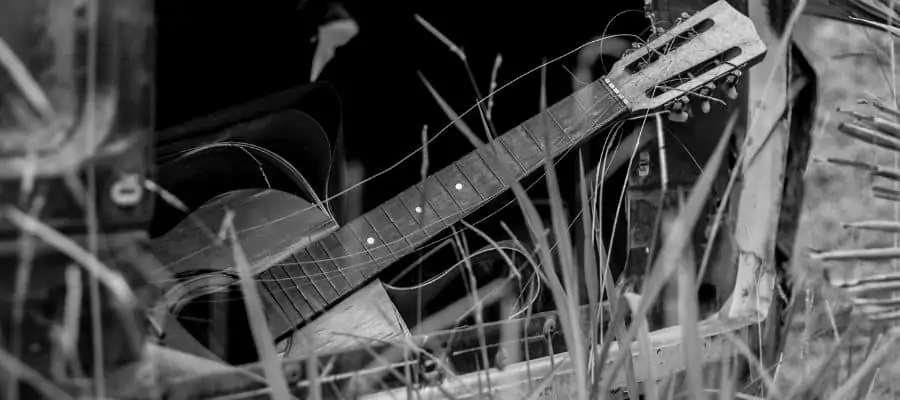
Guitars do lose their shine if they are not played. Your guitar will go out of tune, and strings will wear out from the passing time. The rust will also develop on the strings and also on the other metal parts of the guitar.
It is called corrosion. The moisture in the air rusts them over time. Over time, small kinks begin to form along the length of the strings. They affect the tone and feel of the strings and also increase the possibility the strings will break. Over time, the windings can become loose, making the string very unpredictable.
The strings exert constant pressure over the fretboard. If you play regularly, you are letting go of that tension. But when you don’t play it for a long time, the tension gets a bit too much for the fretboard to handle, and the action becomes high. The strings come over the fretboard to such an extent that playing becomes impossible.
Also, your guitar might not sound the same if not used for years, especially if you didn’t store your guitar properly. So, for many reasons, don’t buy the guitar if you don’t have time to play on it or a place for a safe store.
Does Having Too Many Guitars Prevent You From Improving As A Guitarist?
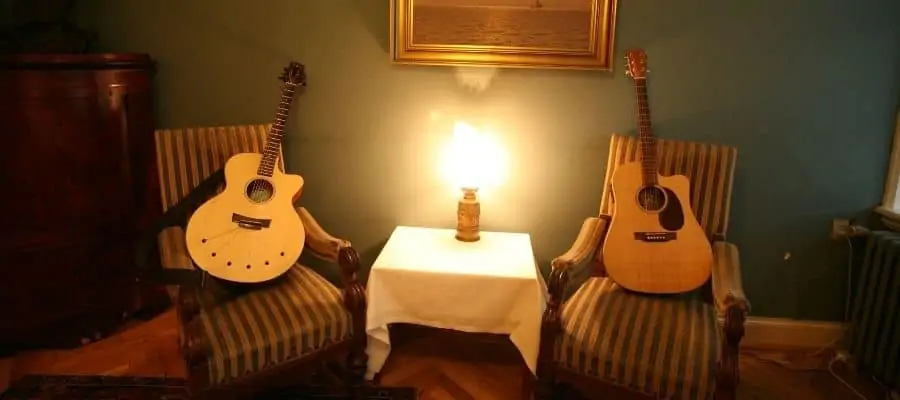
Having too many guitars does prevent you from improving. You become familiar with the mechanics of that one guitar, its string tension, scale length, string spacing, the output of the pickups, its reaction to the amp, or its reaction with the pedal, and so on.
Practicing on the same guitar can make a huge difference in a guitarist’s progress. Great players who use just one guitar seemed to develop a deep affinity and relationship with the instrument. Some players say that they often get frustrated when they switch between guitars, and they have to dig in and practice a song again to re-learn it. You would never feel as comfortable as you might otherwise on one guitar that you are accustomed to playing all the time.
Just think of the football player who keeps changing football clubs: no comfort, no affinity, no improvement.
Conclusion
You can’t say how many guitars are too many in general. Everyone has different needs and stages in playing guitar, and how many guitars does the guitarist need depends on the guitarist. The most important thing is not to mix the words “want” and “need” and to split a desire from the needs.
Some of the guitarists have a problem with the Guitar Acquisition Syndrome, where they go through seven stages of this condition and have no control over buying equipment. This is the problem if GAS starts to have an impact on other aspects of guitarists’ lives.
Some players need more than one guitar because they want to play different styles of music, they want to have more guitars for more tunings to save their time, and also, some of them are afraid of getting something wrong on the stage, so they have spare guitars.
If you want to cover all of the styles, one acoustic, one electric, and one classical guitar will be enough for you. Nowadays, tunings are not a nightmare anymore with a tuner pedal or a headstock tuner. But, if you love experimenting with modifications, if you are afraid of your guitar being stolen while traveling, or you are a professional, the collection might be bigger. Repeated, everything depends on the guitarist’s needs. If you constantly switch between guitars for no reason, you will be further away from your playing improvement.
Be rational and buy one more guitar if you have enough money for your living, a proper place to store the guitar safely, and time to play it and to take care of it. Otherwise, you will find corrosion on your guitar over time.
If you found this article useful, you may want to save this pin below to your Guitar board.

Recent Posts
When learning new songs have you noticed that some of the chord sequences sound really good? But when you tried to come up with your own chord sequence, or as we call it chord progression, you found...
Some guitarists insist on buying an expensive amplifier with their electric guitar. They assume that this is a must for every type of guitarist out there. However, in some situations, this isn’t...

